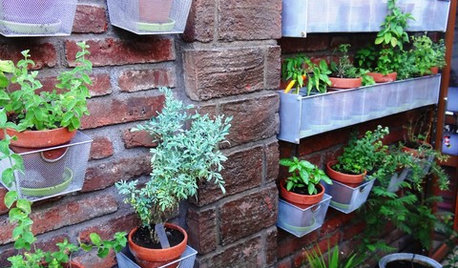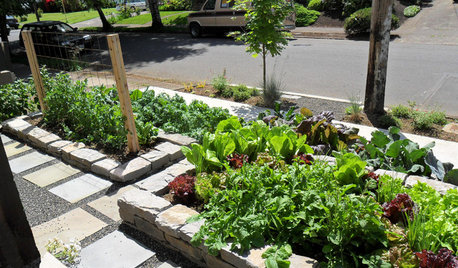How long do you 'age' fresh manure?
gamebird
16 years ago
Related Stories

GARDENING GUIDESThe Poop Scoop: Enrich Your Soil With Good Old Manure
Get over the ick factor already — this natural super-ingredient for soil has so many benefits, you'll wonder why you ever went chemical
Full Story
KIDS’ SPACES5 Teen and Tween Girls' Rooms With Fresh-Faced Style
Youthful and light, these girls' bedrooms show an age-appropriate mix of playful spirit and design-savvy sophistication
Full Story
DECORATING GUIDESPaper Chase: Wallpaper Through the Ages to Today
Get on a decorating roll with a wall covering that's been around for centuries but comes in more exciting designs than ever
Full Story

HOUZZ TOURSMy Houzz: Youthful Freshness for a Traditional Toronto Home
Modern and handmade touches help antiques and traditional architecture lighten up in a hundred-year-old Canadian house
Full Story
GARDENING GUIDES9 Fresh Herbs for Crowd-Pleasing Thanksgiving Dishes
Pluck these herbs from a windowsill pot or a garden for a Thanksgiving meal that sings with fresh flavor
Full Story
DECORATING GUIDESHouzz Tour: Layered Look Adds a Fresh Sense of Style
Midcentury art, pottery and a mix of furnishings bring a hip edge to a traditional Los Angeles home
Full Story
HOLIDAYSHow to Care for Your Christmas Tree
Keep your tree looking lush until the last ornament is packed away with these tips for watering, using stands and more
Full Story
FRONT YARD IDEASWelcome Edibles Into the Front Yard for Fresh Food and More
Give your front yard design a boost and maybe even make new friends by growing fruits and vegetables
Full Story
HOUZZ TOURSHouzz Tour: New Love and a Fresh Start in a Midcentury Ranch House
A Nashville couple, both interior designers, fall for a neglected 1960 home. Their renovation story has a happy ending
Full Story







digdirt2
gamebirdOriginal Author
Related Professionals
Bellflower Landscape Architects & Landscape Designers · Salem Landscape Architects & Landscape Designers · Brentwood Landscape Contractors · Edmond Landscape Contractors · Peabody Landscape Contractors · Emmaus Landscape Contractors · Glendale Heights Landscape Contractors · Mission Landscape Contractors · Rancho Santa Margarita Landscape Contractors · Riverhead Landscape Contractors · Batavia Decks, Patios & Outdoor Enclosures · Clute Decks, Patios & Outdoor Enclosures · Diamond Bar Decks, Patios & Outdoor Enclosures · Fredonia Decks, Patios & Outdoor Enclosures · Mebane Decks, Patios & Outdoor Enclosuresidaho_gardener
life_astounding_yahoo_com